初中英语五种时态讲解
- 格式:doc
- 大小:45.00 KB
- 文档页数:4
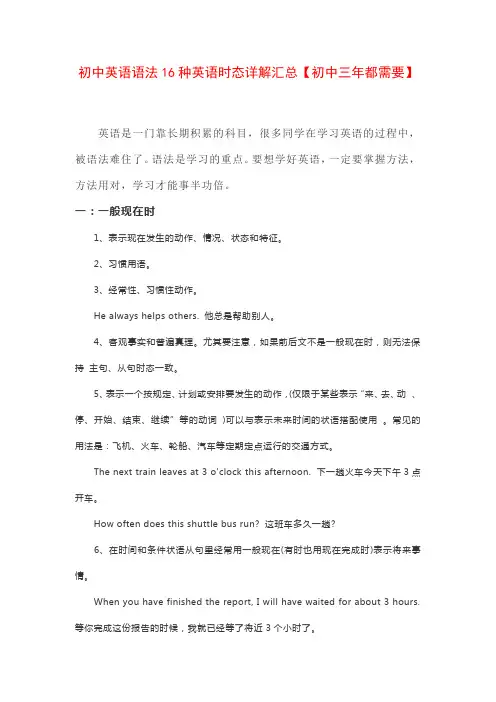
初中英语语法16种英语时态详解汇总【初中三年都需要】英语是一门靠长期积累的科目,很多同学在学习英语的过程中,被语法难住了。
语法是学习的重点。
要想学好英语,一定要掌握方法,方法用对,学习才能事半功倍。
一:一般现在时1、表示现在发生的动作、情况、状态和特征。
2、习惯用语。
3、经常性、习惯性动作。
He always helps others. 他总是帮助别人。
4、客观事实和普遍真理。
尤其要注意,如果前后文不是一般现在时,则无法保持主句、从句时态一致。
5、表示一个按规定、计划或安排要发生的动作,(仅限于某些表示“来、去、动、停、开始、结束、继续”等的动词)可以与表示未来时间的状语搭配使用。
常见的用法是:飞机、火车、轮船、汽车等定期定点运行的交通方式。
The next train leaves at 3 o'clock this afternoon. 下一趟火车今天下午3点开车。
How often does this shuttle bus run? 这班车多久一趟?6、在时间和条件状语从句里经常用一般现在(有时也用现在完成时)表示将来事情。
When you have finished the report, I will have waited for about 3 hours. 等你完成这份报告的时候,我就已经等了将近3个小时了。
二:现在进行时(be doing)1,表示说话时正在进行或发生的动作。
Please don't make so much noise. I'm writing a composition. 不要吵闹。
我正在写作文。
Let's set off. It isn’t raining now. 咱们出发吧。
现在不下雨了。
这类情况常与now现在,at the present现在,at the moment现在,today 今天,this week这个星期,this year今年等时间状语连用。
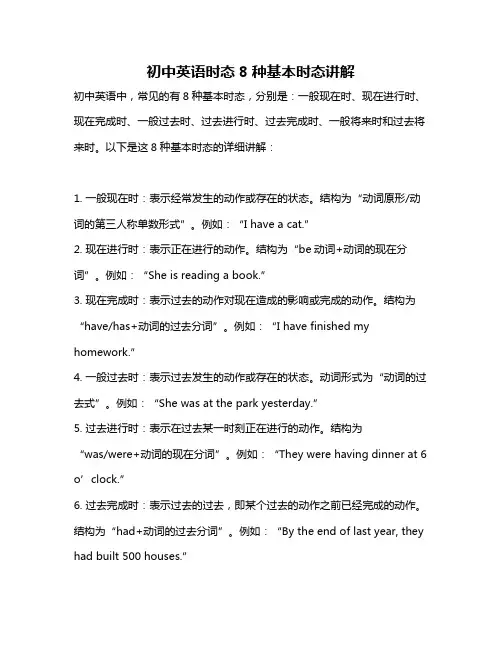
初中英语时态8种基本时态讲解初中英语中,常见的有8种基本时态,分别是:一般现在时、现在进行时、现在完成时、一般过去时、过去进行时、过去完成时、一般将来时和过去将来时。
以下是这8种基本时态的详细讲解:1. 一般现在时:表示经常发生的动作或存在的状态。
结构为“动词原形/动词的第三人称单数形式”。
例如:“I have a cat.”2. 现在进行时:表示正在进行的动作。
结构为“be动词+动词的现在分词”。
例如:“She is reading a book.”3. 现在完成时:表示过去的动作对现在造成的影响或完成的动作。
结构为“have/has+动词的过去分词”。
例如:“I have finished my homework.”4. 一般过去时:表示过去发生的动作或存在的状态。
动词形式为“动词的过去式”。
例如:“She was at the park yesterday.”5. 过去进行时:表示在过去某一时刻正在进行的动作。
结构为“was/were+动词的现在分词”。
例如:“They were having dinner at 6 o’clock.”6. 过去完成时:表示过去的过去,即某个过去的动作之前已经完成的动作。
结构为“had+动词的过去分词”。
例如:“By the end of last year, they had built 500 houses.”7. 一般将来时:表示将来要发生的动作或存在的状态。
结构为“will+动词原形”或“am/is/are going to+动词原形”。
例如:“We will visit the museum next week.”8. 过去将来时:表示从过去的某一时刻看,将来要发生的动作或存在的状态。
结构为“would+动词原形”或“was/were going to+动词原形”。
例如:“He said he would come back soon.”以上就是初中英语8种基本时态的讲解,希望对你有帮助!。
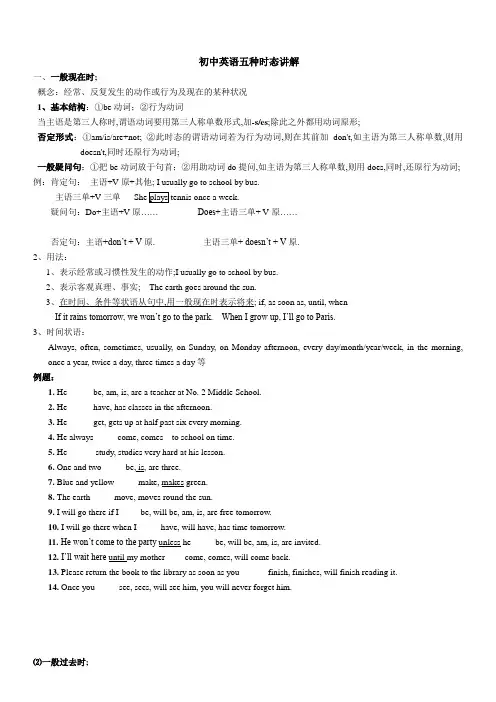
初中英语五种时态讲解一、一般现在时;概念:经常、反复发生的动作或行为及现在的某种状况1、基本结构:①be动词;②行为动词当主语是第三人称时,谓语动词要用第三人称单数形式,加-s/es;除此之外都用动词原形;否定形式:①am/is/are+not; ②此时态的谓语动词若为行为动词,则在其前加don't,如主语为第三人称单数,则用doesn't,同时还原行为动词;一般疑问句:①把be动词放于句首;②用助动词do提问,如主语为第三人称单数,则用does,同时,还原行为动词; 例:肯定句:主语+V原+其他; I usually go to school by bus.主语三单+V三单疑问句:Do+主语+V原…… Does+主语三单+ V原……否定句:主语+don’t + V原. 主语三单+ doesn’t + V原.2、用法:1、表示经常或习惯性发生的动作;I usually go to school by bus.2、表示客观真理、事实; The earth goes around the sun.3、在时间、条件等状语从句中,用一般现在时表示将来; if, as soon as, until, whenIf it rains tomorrow, we won’t go to the park. When I grow up, I’ll go to Paris.3、时间状语:Always, often, sometimes, usually, on Sunday, on Monday afternoon, every day/month/year/week, in the morning, once a year, twice a day, three times a day等例题:1. He______be, am, is, are a teacher at No. 2 Middle School.2. He______have, has classes in the afternoon.3. He______get, gets up at half past six every morning.4. He always _____come, comes to school on time.5. He ______study, studies very hard at his lesson.6. One and two _____be, is, are three.7. Blue and yellow _____make, makes green.8. The earth _____move, moves round the sun.9. I will go there if I ____ be, will be, am, is, are free tomorrow.10. I will go there when I _____have, will have, has time tomorrow.11. He won’t come to the party unless he _____be, will be, am, is, are invited.12. I’ll wait here until my mother ____come, comes, will come back.13. Please return the book to the library as soon as you ______finish, finishes, will finish reading it.14. Once you _____see, sees, will see him, you will never forget him.⑵一般过去时;1、⑴表示过去某个时间发生的动作或存在的状态; I got up late this morning.⑵表示过去的习惯或经常发生的动作;When I was in the countryside. I often swam in the river. I used to go fishing.2、结构:基本结构:①be动词;②行为动词否定形式:①was/were+not; ②在行为动词前加didn't,同时还原行为动词;一般疑问句:①was或were放于句首;②用助动词do的过去式did 提问,同时还原行为动词;例:肯定句:主语+ V过去+其他;疑问句:Did+主语+ V原……否定句:主语+didn’t+ V原3、动词的规则变化;4、时间状语:Yesterday, last night/week/year/month, last Sunday, in 1995, the other day, just now, ago等例题:1. He____be, was, were, been here a moment ago.2. They ____be, was, were, been here just now.3. The scientists _____leave, leaves, leaved, left for America yesterday.4. Last week we ______visit, visited the Science Museum.5. When I was a child, I often ____play, played football.6. The students ran out of the classroom as soon as the bell ____ring, rang, rung.⑶一般将来时;①肯定句:否定句:注:当主语为I 或we时,问句中可用shall where shall we meet tomorrow②be going to+ V原表示计划、打算做某事;用来表示近期或事先考虑过的将要发生的动作以及已有迹象表明必将发生某事,意为“打算;就要”; be going to do 将要干某事---what are you going to do next Sunday ---I am going to listen to music.Look at the clouds, there is going to rain.③现在进行时be +Ving 有时可以表示将来;常用这种结构的动词:go, come, leave, stay, start, arrive We’re leaving for London.例题:1 . _____you ____a doctor when you grow upA .Will; going to be B. Are; going to be C. Are; / D .Will; be2. I don’t know if his uncle _____. I think he _____ if it doesn’t rain.A will come; comesB will come; will comeC comes; comesD comes; will come3 . He will be back _____a few minutes.A withB forC onD in4. What time _____we meet at the gate tomorrowA willB shallC doD are5. He will have a holiday as soon as he _____the work next week.A finishes B. doesn’t finish C will finish D won’t finish6 .There _____some showers this afternoon.A will beB will haveC is going to beD are going to have7. It ____my brother’s birthday tomorrow. She _____a party.A is going to be; will haveB will be; is havingC will be; is going to haveD will have; is going to be8. Li Ming is 10 years old now, next year he _____11.A isB is going to beC will beD will to be与will区别:两者都可表示将要发生的事、将要去做某事,但它们有如下几点区别:1. 表示近期、眼下就要发生的事情,will 表示的将来时间则较远一些,如:He is going to write a letter tonight.He will write a book .2. 表示根据主观判断将来肯定发生的事情,will表示客观上将来势必发生的事情;He is seriously ill. He is going to die.He will be twenty years old.3. be going to 含有“计划,准备”的意思,而will 则没有这个意思,如:She is going to lend us her book.He will be here in half an hour.4.在有的主句中,一般不用be going to, 而多用will, 如:If any beasts comes at you, I'll stay with you and help you4现在进行时1、构成:肯定句:主语+ is / am / are +ving疑问句:Is /Am /Are + 主语+ving否定句:主语+ isn’t / am not / aren’t + ving2、用法:①表示正在进行的动作I’m reading book now.②表示现阶段正在进行的动作或状态; They are studying hard this term.3、时间状语:now , these days, 当句中有look, listen , can’t you see, can you see时Listen He is singing.例题:1. I ____write, am writing, is writing, are writing a letter now.2. Look, it _____begin, is beginning, am beginning, are beginning to rain.3. They ____study, is studying, am studying, are studying medicine at the Medical Institute of Chengde these days.4. He _____teach, am teaching, is teaching, are teaching an English lesson at this time.5 过去进行时1、结构was / were + doing2、用法①表示过去某段时间正在进行的动作---what were you doing at 9:30 last night --- I was watching TV.3、when一般接一般过去时I was doing my homework whenwhile一般接进行时WhileHe was playing basketball while she was reading books.例题:1. I _____cook, cooked, was cooking, were cooking breakfast when you arrived.____you_____ do, did, was...doing, were…doing at this time yesterday eveninghave, are having, had, were having dinner when the doorbell rang.When/ As we____ have, had, are having, were having dinner, the doorbell rang.动词基本变化形式:。
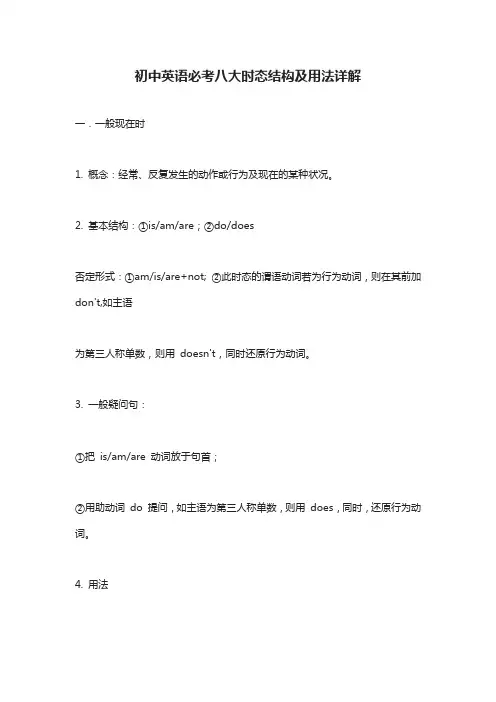
初中英语必考八大时态结构及用法详解一.一般现在时1. 概念:经常、反复发生的动作或行为及现在的某种状况。
2. 基本结构:①is/am/are;②do/does否定形式:①am/is/are+not; ②此时态的谓语动词若为行为动词,则在其前加don't,如主语为第三人称单数,则用doesn't,同时还原行为动词。
3. 一般疑问句:①把is/am/are 动词放于句首;②用助动词do 提问,如主语为第三人称单数,则用does,同时,还原行为动词。
4. 用法1)经常性或习惯性的动作,常与表示频度的时间状语连用。
例如:I leave home for school at 7 every morning. 每天早上我七点离开家。
2)客观真理,客观存在,科学事实。
例如:The earth moves around the sun. 地球绕太阳转动。
Shanghai lies in the east ofChina. 上海位于中国东部。
3)表示格言或警句。
例如:Pride goes before a fall 骄者必败。
注意:此用法如果出现在宾语从句中,即使主句是过去时,从句谓语也要用一般现在时。
例如:Columbus proved that the earth is round. 哥伦布证实了地球是圆的。
4)现在时刻的状态、能力、性格、个性。
例如:I don't want so much. 我不要那么多。
Ann writes good English but does not speak well.安英语写得不错,讲的可不行。
5)一般现在时表示将来含义。
a. 下列动词come, go, arrive, leave, start, begin, return 的一般现在时可以表示将来,主要用来表示在时间上已确定或安排好的事情。
例如:The train leaves at six tomorrow morning. 火车明天上午六点开。
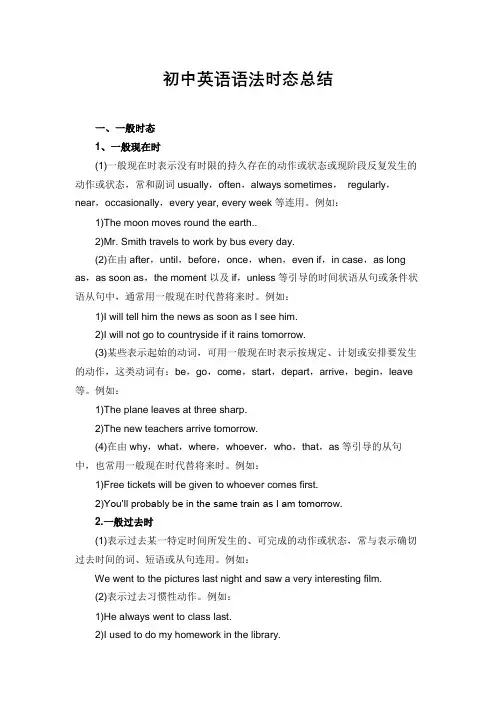
初中英语语法时态总结一、一般时态1、一般现在时(1)一般现在时表示没有时限的持久存在的动作或状态或现阶段反复发生的动作或状态,常和副词usually,often,always sometimes,regularly,near,occasionally,every year, every week等连用。
例如:1)The moon moves round the earth..2)Mr. Smith travels to work by bus every day.(2)在由after,until,before,once,when,even if,in case,as long as,as soon as,the moment以及if,unless等引导的时间状语从句或条件状语从句中,通常用一般现在时代替将来时。
例如:1)I will tell him the news as soon as I see him.2)I will not go to countryside if it rains tomorrow.(3)某些表示起始的动词,可用一般现在时表示按规定、计划或安排要发生的动作,这类动词有:be,go,come,start,depart,arrive,begin,leave 等。
例如:1)The plane leaves at three sharp.2)The new teachers arrive tomorrow.(4)在由why,what,where,whoever,who,that,as等引导的从句中,也常用一般现在时代替将来时。
例如:1)Free tickets will be given to whoever comes first.2)You’ll probably be in the same train as I am tomorrow.2.一般过去时(1)表示过去某一特定时间所发生的、可完成的动作或状态,常与表示确切过去时间的词、短语或从句连用。
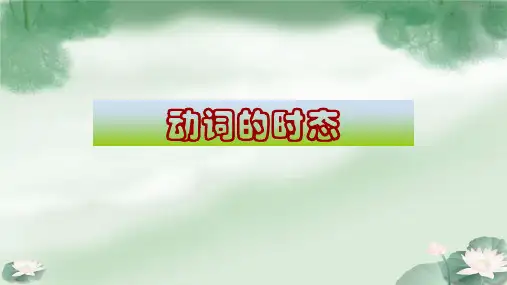
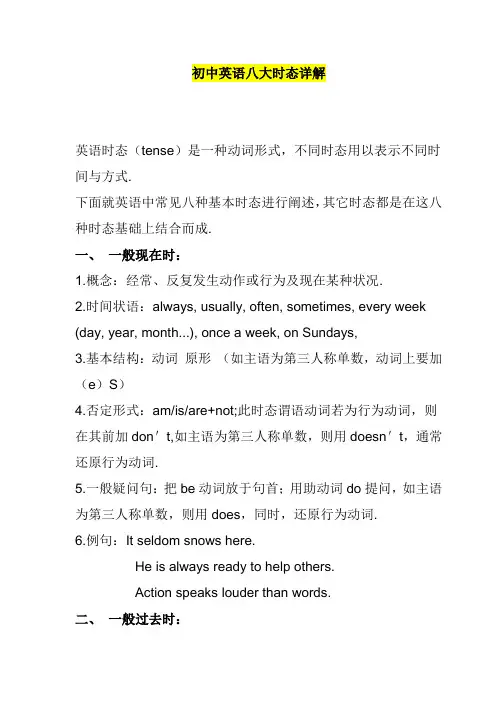
初中英语八大时态详解英语时态(tense)是一种动词形式,不同时态用以表示不同时间与方式.下面就英语中常见八种基本时态进行阐述,其它时态都是在这八种时态基础上结合而成.一、一般现在时:1.概念:经常、反复发生动作或行为及现在某种状况.2.时间状语:always, usually, often, sometimes, every week (day, year, month...), once a week, on Sundays,3.基本结构:动词原形(如主语为第三人称单数,动词上要加(e)S)4.否定形式:am/is/are+not;此时态谓语动词若为行为动词,则在其前加don't,如主语为第三人称单数,则用doesn't,通常还原行为动词.5.一般疑问句:把be动词放于句首;用助动词do提问,如主语为第三人称单数,则用does,同时,还原行为动词.6.例句:It seldom snows here.He is always ready to help others.Action speaks louder than words.二、一般过去时:1.概念:过去某个时间里发生动作或状态;过去习惯性、经常性动作、行为.2.时间状语:ago, yesterday, the day before yesterday, last week(year, night, month…), in 1989, just now, at the age of 5, one day, long long ago, once upon a time, etc.3.基本结构:be动词;行为动词4.否定形式:was/were+not;在行为动词前加didn't,同时还原行为动词.5.一般疑问句:was或were放于句首;用助动词do过去式did 提问,同时还原行为动词.6.例句:She often came to help us in those days.I didn't know you were so busy.三、现在进行时:1.概念:表示现阶段或说话时正在进行动作及行为.2.时间状语:now, at this time, these days, etc.3.基本结构:am/is/are+doing4.否定形式:am/is/are+not+doing.5.一般疑问句:把be动词放于句首.6.例句:How are you feeling today?He is doing well in his lessons.四、过去进行时:1.概念:表示过去某段时间或某一时刻正在发生或进行行为或动作.2.时间状语:at this time yesterday, at that time或以when引导谓语动词是一般过去时时间状语等.3.基本结构:was/were+doing4.否定形式:was/were + not + doing.5.一般疑问句:把was或were放于句首.6.例句:At that time she was working in a PLA unit.When he came in, I was reading a newspaper.五、现在完成时:1.概念:过去发生或已经完成动作对现在造成影响或结果,或从过去已经开始,持续到现在动作或状态.2.时间状语:recently, lately, since…for…,in th e past few years, etc.3.基本结构:have/has + done4.否定形式:have/has + not +done.5.一般疑问句:have或has提前6.例句:I've written an article.It has been raining these days.六、过去完成时:1.概念:以过去某个时间为标准,在此以前发生动作或行为,或在过去某动作之前完成行为,即“过去过去”.2.时间状语:before, by the end of last year(term, month…),etc.3.基本结构:had + done.4.否定形式:had + not + done.5.一般疑问句:had放于句首.6.例句:As soon as we got to the station, the train had left.By the end of last month. We had reviewed four books七、一般将来时:1.概念:表示将要发生动作或存在状态及打算、计划或准备做某事.2.时间状语:tomorrow, next day(week, month, year…),soon, ina few minutes, by…,the day after tomorrow, etc.3.基本结构:am/is/are/going to + do;will/shall + do.4.否定形式:was/were + not; 在行为动词前加won't,同时还原行为动词.5.一般疑问句:be放于句首;will/shall提到句首.6.例句:They are going to have a competition with us in studies.It is going to rain.八、过去将来时:1.概念:立足于过去某一时刻,从过去看将来,常用于宾语从句中.2.时间状语:the next day(morning, year…),the following month(week…),etc.3.基本结构:was/were/going to do;would/should + do.4.否定形式:was/were/not + going to + do;would/should + not + do.5.一般疑问句:was或were放于句首;would/should 提到句首.6.例句:He said he would go to Beijing the next day.I asked who was going there .小结:1.一般现在时: 主语+do/does(现在分词)e.g We clean the room every day.2.一般过去时: 主语+dide.g We cleaned the room just now.3.现在进行时: 主语+am/is/are doinge.g We are cleaning the room now.4.过去进行时: was/were doinge.g We were cheaning the room at 5:00 yesterday afternoon.5.现在完成时: have/has donee.g.We have cleaned the room already.6.过去完成时: had donee.g We had cleaned the room before he arrived.7.一般将来时: will do/e.g We will clean the room tomorrow.8.过去将来时: was/were to /would doe.g He said he would clean the room next.。
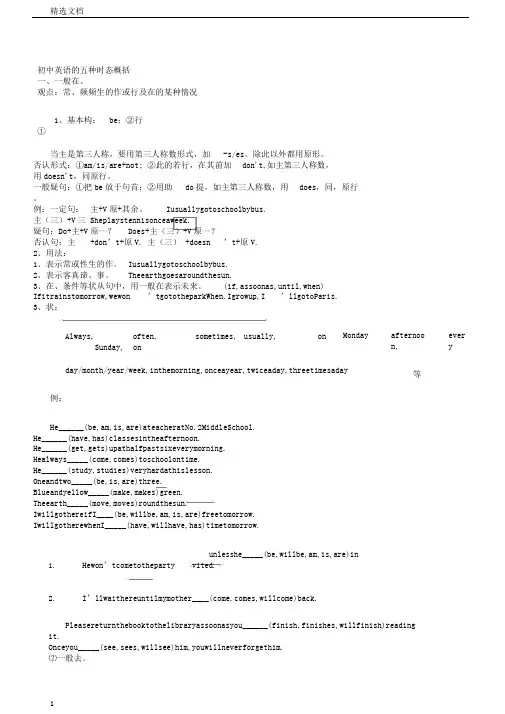
初中英语的五种时态概括一、一般在。
观点:常、频频生的作或行及在的某种情况1、基本构:①be;②行当主是第三人称,要用第三人称数形式,加-s/es。
除此以外都用原形。
否认形式:①am/is/are+not;②此的若行,在其前加don't,如主第三人称数,用doesn't,同原行。
一般疑句:①把be放于句首;②用助do提,如主第三人称数,用does,同,原行。
例:一定句:主+V原+其余。
Iusuallygotoschoolbybus.主(三)+V三 Sheplaystennisonceaweek.疑句:Do+主+V原⋯⋯?Does+主(三)+V原⋯⋯?否认句:主+don’t+原V. 主(三) +doesn ’t+原V.2、用法:1、表示常或性生的作。
Iusuallygotoschoolbybus.2、表示客真谛、事。
Theearthgoesaroundthesun.3、在、条件等状从句中,用一般在表示未来。
(if,assoonas,until,when) Ifitrainstomorrow,wewon ’tgototheparkWhen.Igrowup,I’llgotoParis.3、状:Always, often, sometimes, usually, on Sunday, on Monday afternoon,everyday/month/year/week,inthemorning,onceayear,twiceaday,threetimesaday等例:He______(be,am,is,are)ateacheratNo.2MiddleSchool.He______(have,has)classesintheafternoon.He______(get,gets)upathalfpastsixeverymorning.Healways_____(come,comes)toschoolontime.He______(study,studies)veryhardathislesson.Oneandtwo_____(be,is,are)three.Blueandyellow_____(make,makes)green.Theearth_____(move,moves)roundthesun.IwillgothereifI____(be,willbe,am,is,are)freetomorrow.IwillgotherewhenI_____(have,willhave,has)timetomorrow.11.Hewon’tcometothepartyunlesshe_____(be,willbe,am,is,are)in vited.12.I’llwaithereuntilmymother____(come,comes,willcome)back.Pleasereturnthebooktothelibraryassoonasyou______(finish,finishes,willfinish)reading it.Onceyou_____(see,sees,willsee)him,youwillneverforgethim.⑵一般去。
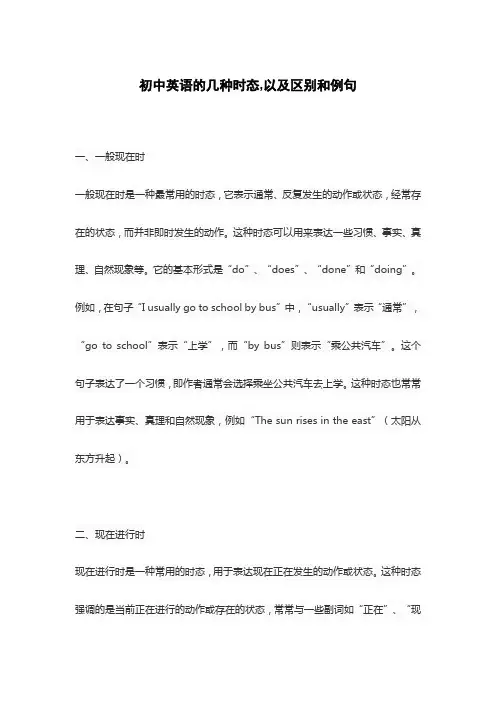
初中英语的几种时态,以及区别和例句一、一般现在时一般现在时是一种最常用的时态,它表示通常、反复发生的动作或状态,经常存在的状态,而并非即时发生的动作。
这种时态可以用来表达一些习惯、事实、真理、自然现象等。
它的基本形式是“do”、“does”、“done”和“doing”。
例如,在句子“I usually go to school by bus”中,“usually”表示“通常”,“go to school”表示“上学”,而“by bus”则表示“乘公共汽车”。
这个句子表达了一个习惯,即作者通常会选择乘坐公共汽车去上学。
这种时态也常常用于表达事实、真理和自然现象,例如“The sun rises in the east”(太阳从东方升起)。
二、现在进行时现在进行时是一种常用的时态,用于表达现在正在发生的动作或状态。
这种时态强调的是当前正在进行的动作或存在的状态,常常与一些副词如“正在”、“现在”等配合使用。
在语言中,这种时态具有非常重要的作用,它可以帮助人们更好地理解和描述现在正在发生的事情。
现在进行时的基本形式是采用动词的现在分词形式,即以动词的-ing形式来表示。
在英语中,动词的现在分词形式可以通过在动词后面加上-ing来实现。
例如,“play”这个动词的现在分词形式就是“playing”。
在句子中,现在进行时通常采用“be动词+现在分词”的形式来表示。
例如,“They are playing basketball now.”(他们现在正在打篮球。
)这句话中,“are playing”就是现在进行时的形式,表达了他们正在打篮球的状态。
现在进行时不仅仅用于表达正在进行的动作,还可以用于表达正在持续的状态。
例如,“The weather is sunny now.”(现在天气晴朗。
)这句话中,“is sunny”就是现在进行时形式,表达了天气正在持续晴朗的状态。
三、一般将来时一般将来时是一种时态,它表示将来发生的动作或状态。
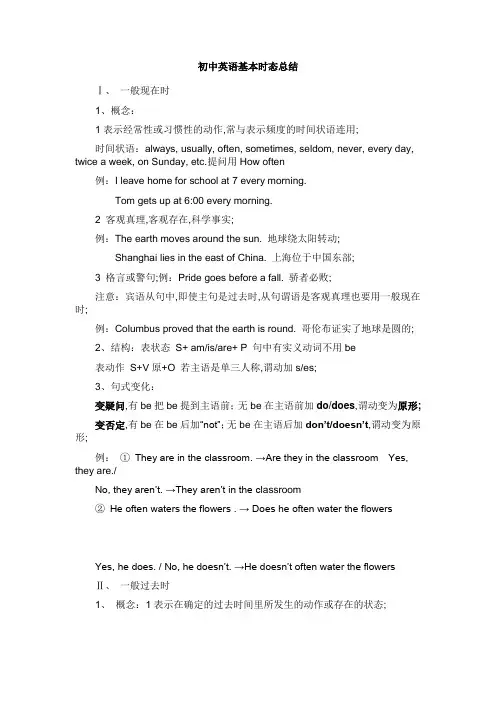
初中英语基本时态总结Ⅰ、一般现在时1、概念:1表示经常性或习惯性的动作,常与表示频度的时间状语连用;时间状语:always, usually, often, sometimes, seldom, never, every day, twice a week, on Sunday, etc.提问用How often例:I leave home for school at 7 every morning.Tom gets up at 6:00 every morning.2 客观真理,客观存在,科学事实;例:The earth moves around the sun. 地球绕太阳转动;Shanghai lies in the east of China. 上海位于中国东部;3 格言或警句;例:Pride goes before a fall. 骄者必败;注意:宾语从句中,即使主句是过去时,从句谓语是客观真理也要用一般现在时;例:Columbus proved that the earth is round. 哥伦布证实了地球是圆的;2、结构:表状态S+ am/is/are+ P 句中有实义动词不用be表动作S+V原+O 若主语是单三人称,谓动加s/es;3、句式变化:变疑问,有be把be提到主语前;无be在主语前加do/does,谓动变为原形;变否定,有be在be后加“not”;无be在主语后加don’t/doesn’t,谓动变为原形;例:①They are in the classroom. →Are they in the classroom Yes, they are./No, they aren’t. →They aren’t in the cl assroom②He often waters the flowers . → Does he often water the flowersYes, he does. / No, he doesn’t. →He doesn’t often water the flowersⅡ、一般过去时1、概念:1表示在确定的过去时间里所发生的动作或存在的状态;常用时间状语:yesterday, the day before yesterday, last week, just now, an hour ago, the other day, in 1982. at the age of 5, one day, long long ago, etc.例:Where did you go just now2表示在过去一段时间内,经常性或习惯性的动作;例:When I was a child, I often played football in the street.2、结构:表状态S+ was/were+ P表动作S+V过去式+O 注:句中有实义动词不用be3、句式变化:变疑问,有be把be提到主语前;无be在主语前加did,谓动变为原形;变否定,有be在be后直接加“not”;无be在主语后加didn’t,谓动变为原形.例:①She was in Xi’an last month. → Was she in Xi’an last monthYes, she was. /No, she wasn’t. →She wasn’t in Xi’an last month.②Danny grew a rose just now, → Did Danny grow a rose just nowYes, he did. / No, he didn’t. →Danny didn’t grow a rose just now,Ⅲ、现在进行时:1. 概念:表示现阶段或说话时正在进行的动作;时间状语:now, at this time, these days,以及有look, listen时;例:ListenThe birds are singing.2、结构:S + am/is/are + doing助动现在分词3、句式变化:变疑问,把am/is/are提到主语前;变否定,在am/is/are后直接加“not”;例:①I am writing a letter now. → Are you writing a letter nowYes, I am. /No, I’m not. →I am not writing a letter now. 注:am和not不能缩写;②The boys are playing football. → Are the boys playing footballYes, they are. / No, they aren’t. →The boys aren’t playing football.Ⅳ、过去进行时:1. 概念:表示过去某段时间或某一时刻正在发生或进行的动作;.时间状语:at this time yesterday, at that time,at 8:00 yesterday,或有when / while引导的时间状语从句等;例:We were having an English class at 9:30 yesterday morning.I was reading a book while my mother was watching TV.2、结构:S + was/were + doing3、句式变化:变疑问,把was/were提到主语前;变否定,在was/were后直接加“not”;例:①At that time they were working in the garden. → Were they working inthe garden at that timeYes, they were. / No, they weren’t.→At that time they were working in the garden.②When he came in, I was reading a newspaper. →When he came in, were you reading a newspaperYes, I was. / No, I wasn’t.→When he came in, I wasn’t reading a newspaper.Ⅴ、一般将来时1. 概念:表示将要发生的动作或存在的状态;时间词:tomorrow, tomorrow morning, at seven o'clock tomorrow evening, next year, this year, at the end of this term, from now,in ten minutes, in 2025例:They will do an experiment tomorrow afternoon.Brian is going to draw twenty pictures at the end of this term.2、结构:S +will+ V原+其他will 可改为be going to ,当主语是第一人称时will可用shall例:Which paragraph shall I read first 我先读哪一段呢Will you/Are you going tobe at home at seven this evening3、句式变化:变疑问,把will提到主语前;变否定,在will后直接加“not”;例; She will drive to Beijing next week. → Will she drive to Beijing next weekYes, she will. / No, she won’t. →She won’t drive to Beijing next week.★be going to + V原表示a. 主语的意图,即将做某事;例:What are you going to do tomorrowb. 计划,安排要发生的事;例:The play is going to be produced next month;c. 有迹象要发生的事;例:Look at the dark clouds, there is going to be a storm.★be +不定式:表示将来,按计划或正式安排将发生的事;例:We are to discuss the report next Saturday. 我们下星期六将讨论这份报告★用现在进行时表示将来come, go, arrive, leave, start, begin, return等终止性动词可用现在进行时表示将来;例:I'm leaving tomorrow. 明天我要走了;Are you staying here till next week 你会在这儿呆到下周吗Ⅶ、现在完成时:1. 表示:①过去发生或已经完成的动作对现在造成的影响或结果;时间词:ever, never, already, yet, before, just, recently/ lately最近, in the past few years2. ②或从过去已经开始持续到现在的动作或状态; 时间词:for + 时间段,since +过去时间点/从句;提问用How long例:The countryside has changed a lot in the past few years.He has learned French for two years.2.结构:S + have/has + done助动过去分词3. 句式变化:变疑问,把have/has提到主语前;变否定,在have/has后直接加“not”;例:①I've already written an article. → Have you written an article yet Yes, I h ave. / No, I haven’t. →I haven’t written an article yet.②Li Ming has lived in Shijiazhuang since 1993.→ Has Li Ming lived in Shijiazhuang since 1993 Yes, he has. / No, he hasn’t.→Li Ming hasn’t lived in Shijiazhuang since 1993.★比较一般过去时与现在完成时1一般过去时表示过去某具体时间发生的动作或单纯叙述过去的事情,强调动作;现在完成时则强调过去发生的动作对现在的造成影响,强调的是结果;2一般过去时常与具体的时间状语连用,而现在完成时通常与模糊的时间状语连用,或无时间状语;例:I saw this film yesterday. 强调看的动作发生过了I have seen this film. 强调对现在的影响,电影的内容已经知道了Why did you get up so early 强调起床的动作已发生过了Who hasn't handed in his paper 强调有卷子未交,指结果He joined the League three years ago. 强调加入这一动作He has been a League member for three years. 是团员的状态可持续句子中如有过去时的时间副词如yesterday, last, week, in 1960时,不能使用现在完成时,要用过去时;错Tom has written a letter to his parents last night.对Tom wrote a letter to his parents last night.。
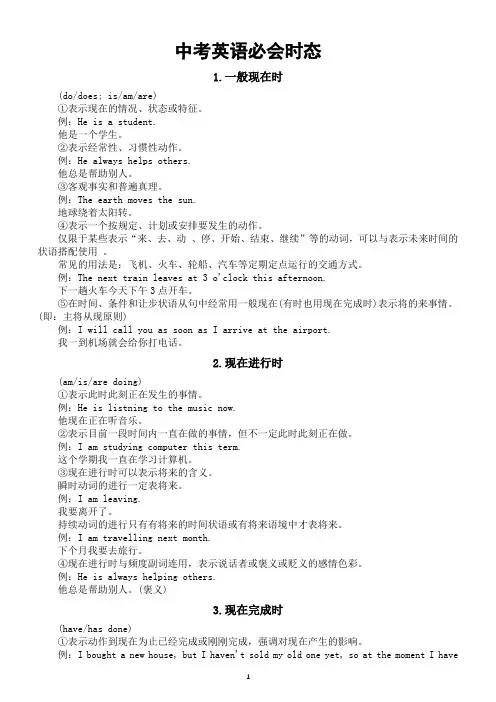
中考英语必会时态1.一般现在时(do/does; is/am/are)①表示现在的情况、状态或特征。
例:He is a student.他是一个学生。
②表示经常性、习惯性动作。
例:He always helps others.他总是帮助别人。
③客观事实和普遍真理。
例:The earth moves the sun.地球绕着太阳转。
④表示一个按规定、计划或安排要发生的动作。
仅限于某些表示“来、去、动、停、开始、结束、继续”等的动词,可以与表示未来时间的状语搭配使用。
常见的用法是:飞机、火车、轮船、汽车等定期定点运行的交通方式。
例:The next train leaves at 3 o'clock this afternoon.下一趟火车今天下午3点开车。
⑤在时间、条件和让步状语从句中经常用一般现在(有时也用现在完成时)表示将的来事情。
(即:主将从现原则)例:I will call you as soon as I arrive at the airport.我一到机场就会给你打电话。
2.现在进行时(am/is/are doing)①表示此时此刻正在发生的事情。
例:He is listning to the music now.他现在正在听音乐。
②表示目前一段时间内一直在做的事情,但不一定此时此刻正在做。
例:I am studying computer this term.这个学期我一直在学习计算机。
③现在进行时可以表示将来的含义。
瞬时动词的进行一定表将来。
例:I am leaving.我要离开了。
持续动词的进行只有有将来的时间状语或有将来语境中才表将来。
例:I am travelling next month.下个月我要去旅行。
④现在进行时与频度副词连用,表示说话者或褒义或贬义的感情色彩。
例:He is always helping others.他总是帮助别人。
(褒义)3.现在完成时(have/has done)①表示动作到现在为止已经完成或刚刚完成,强调对现在产生的影响。
初中英语八大时态讲解英语中,时态是英语语法中重要的组成部分,它表示的是在某个时间段内动作的状态。
初中英语中,时态主要包括八大时态,分别是:一般现在时、一般过去时、一般将来时、过去将来时、现在进行时、过去进行时、现在完成时和过去完成时。
一、一般现在时一般现在时表示的是经常性或习惯性的动作或状态,也可以表示现在的状态或特征。
例如,“I eat breakfast every morning.”这句话中,“eat”这个动作就是经常性的动作,所以使用一般现在时。
二、一般过去时一般过去时表示过去某个时间发生的事情或存在的状态。
例如,“I went to the park yesterday.”这句话中,“went”这个动作发生在过去,所以使用一般过去时。
三、一般将来时一般将来时表示将来某个时间要发生的动作或存在的状态。
例如,“I will go to the park tomorrow.”这句话中,“go”这个动作将在明天发生,所以使用一般将来时。
四、过去将来时过去将来时表示从过去某个时间看,将要发生的动作或存在的状态。
例如,“He said he would go to the park.”这句话中,“he”认为“he would go to the park”是未来要发生的事情,所以使用过去将来时。
五、现在进行时现在进行时表示正在进行的动作或存在的状态。
例如,“I am eating an apple.”这句话中,“eating”这个动作正在进行,所以使用现在进行时。
六、过去进行时过去进行时表示过去某个时间正在进行的动作或存在的状态。
例如,“She said she was watching TV at 8 o’clock last night.”这句话中,“watching TV”这个动作在昨晚8点正在进行,所以使用过去进行时。
七、现在完成时现在完成时表示过去发生的动作对现在造成的影响或结果,也可以表示持续到现在的动作或状态。
初中英语的动词时态主要有五种:一般现在时,一般过去时,一般将来时,现在进行时,现在完成时.1. 一般现时的用法:主要由动词原形表示,但在第三人称单数时要在词尾加-s 。
否定句和疑问句要用助动词do, does.A. 经常性或习惯性的动作。
如The trees get green in spring . 。
B现在特征或状态。
如The Changjiang River is the longest in our country.He doesn` t work in the factory .C.普遍真理。
如The sun rises in the east . Five and two in seven .2现在进行时:现在进行时是由助动词be 的人称形式加现在分词构成。
主要表示现在或现阶段正在进行的动作。
如:Where are they swimming? They are swimming in the river.有些动词的现在进行时表示近期按计划或安排要进行的动作。
这些动词是:go ,come, leave ,start ,arrive , return ,work sleep,stay,play,do,have ,wear…..She is coming to see me tomorrow.3.一般将来时:主要表示将要发生的动作或情况。
由助动词shall 或will加动词原形构成。
/ be going to 加动词原形构成It won’t rain tonight .I shall meet you at the station.He is going to have a swim tomorrow.4.一般过去时:由动词的过去式表示。
表示在过去某个时刻发生的动作或情况。
包括过去习惯性动作。
如;Did you knock at the door just now? / He finished reading the book yesterday.5.现在完成时:由have的人称形式加过去分词构成A 到现在为止已经完成的动作。
初中英语8种时态归纳总结初中英语中,时态主要分为以下八种基本时态:1. 现在简单时态(Simple Present Tense):用来表示经常性、习惯性的动作或客观事实。
例如:I go to school every day.(我每天去学校。
)2. 过去简单时态(Simple Past Tense):用来表示过去发生的动作或状态。
例如:She finished her homework yesterday.(她昨天完成了作业。
)3. 将来简单时态(Simple Future Tense):用来表示将来要发生的动作或事件。
例如:We will visit our grandparents next week.(我们下周要去看望我们的祖父母。
)4. 现在进行时态(Present Continuous Tense):用来表示现在正在进行的动作。
例如:They are playing football in the park.(他们正在公园里踢足球。
)5. 过去进行时态(Past Continuous Tense):用来表示过去某一时刻正在进行的动作。
例如:I was studying when he called me.(他给我打电话时,我正在学习。
)6. 将来进行时态(Future Continuous Tense):用来表示将来某一时刻正在进行的动作。
例如:She will be working on her project tomorrow.(明天她会一直在做她的项目。
)7. 现在完成时态(Present Perfect Tense):用来表示过去发生的动作对现在产生的影响或结果。
例如:I have finished my homework.(我已经完成了我的作业。
)8. 过去完成时态(Past Perfect Tense):用来表示过去某个时间点之前已经完成的动作。
例如:They had already left when we arrived.(当我们到达时,他们已经离开了。
初中英语的八种时态一、一般现在时:表示经常、反复发生的动作或行为以及现在的某种状况。
时间状语:always 、usually、ofen 、sometimes ,every week(day,year, month……) ,once a week, on Sundays, etc.基本结构:○1be动词;○2行为动词否定形式:○1am/is/are+not○2此时态的谓语动词如果为行为动词,则在其前加don,t ,如果主语是第三人称,则用doesn,t ,同时还原行为动词。
一般疑问句:○1把be 动词放在句首○2用助动词do 提问,如主语为第三人称单数,则用does,同时还原行为动词。
二、一般过去时:表示过去某个时间里发生的动作或状态;过去习惯性、经常性的动作、行为。
时间状语:ago, yesterday, the day before yesterday,last week (year, month,night (i)2000,just now ,at the age of 10,one day ,long long ago,once upon a time ,etc.基本结构:○1be动词;○2行为动词否定形式:○1was/were+not ○2在行为动词前加didn,t,同时还原行为动词。
一般疑问句:○1把was或were放于句首○2用助动词do的过去式did 提问,同时还原行为动词。
三、现在进行时:表示现阶段或说话时正在进行的动作或行为。
时间状语:now ,at this time ,these days ,etc.基本结构:am /is /are+doing否定形式:am /is /are+not+doing一般疑问句:把be动词放于句首。
四、过去进行时:表示过去某段时间或某一时刻正在发生或进行的行为或动作。
时间状语:at this time yesterday,at that time 或以when 引导的谓语动词是一般过去时的时间状语等。
中考英语必考时态结构及用法详解一、一般现在时【标志】动词原形1.表示经常性或习惯性动作,常与表频度的时间状语连用:She often speaks English.I leave home for school at 7 every morning.2.表示现在的状态、特征、职业、能力、感觉等:He seems to feel a bit down today.He works as a driver.3.表示真理、客观存在、科学事实或用于格言警句中:Shanghai lies in the east of China.Columbus proved that the earth is round.Where there is a will, there is a way.4.表示现在瞬间的动作:Here comes the bus!5.表示将来1) 表按规定、计划、安排将要发生的动作(仅限于某些表示“来、去、动、停、开始、结束、继续”等的趋向动词),可以与表示未来的时间状语搭配使用。
常见的用法是:飞机、火车、轮船、汽车等定期定点运行的交通状况。
如:The next trai n leaves at 3 o’clock this afternoon.How often does the shuttle bus run?2) 在时间和条件状语从句中常使用一般现在时表示将来发生的事情:When Bill comes (不用will come), ask him to wait for me.I shall go there tomorrow unless I’m too busy.二、一般过去时【标志】动词过去式1.表示过去某时所发生的动作或存在的状态,常与表示过去的时间状语连用(e.g.yesterday, this morning, just now, a moment ago, in May, last night / year / week, once upon a time, the other day, before …, when …, in the past等)。
初中英语五种时态讲解一、一般现在时。
概念:经常、反复发生的动作或行为及现在的某种状况1、基本结构:①be动词;②行为动词当主语是第三人称时,谓语动词要用第三人称单数形式,加-s/es。
除此之外都用动词原形。
否定形式:①am/is/are+not; ②此时态的谓语动词若为行为动词,则在其前加don't,如主语为第三人称单数,则用doesn't,同时还原行为动词。
一般疑问句:①把be动词放于句首;②用助动词do提问,如主语为第三人称单数,则用does,同时,还原行为动词。
例:肯定句:主语+V原+其他。
I usually go to school by bus.主语(三单)+V三单疑问句:Do+主语+V原……?Does+主语(三单)+ V原……?否定句:主语+don’t + V原. 主语(三单)+ doesn’t + V原.2、用法:1、表示经常或习惯性发生的动作。
I usually go to school by bus.2、表示客观真理、事实。
The earth goes around the sun.3、在时间、条件等状语从句中,用一般现在时表示将来。
( if, as soon as, until, when)If it rains tomorrow, we won’t go to the park. When I grow up, I’ll go to Paris.3、时间状语:Always, often, sometimes, usually, on Sunday, on Monday afternoon, every day/month/year/week, in the morning, once a year, twice a day, three times a day等例题:1. He______(be, am, is, are) a teacher at No. 2 Middle School.2. He______(have, has) classes in the afternoon.3. He______(get, gets) up at half past six every morning.4. He always _____(come, comes ) to school on time.5. He ______(study, studies) very hard at his lesson.6. One and two _____(be, is, are) three.7. Blue and yellow _____(make, makes) green.8. The earth _____(move, moves) round the sun.9. I will go there if I ____( be, will be, am, is, are) free tomorrow.10. I will go there when I _____(have, will have, has) time tomorrow.11. He won’t come to the party unless he _____(be, will be, am, is, are) invited.12. I’ll wait here until my mother ____(come, comes, will come) back.13. Please return the book to the library as soon as you ______(finish, finishes, will finish) reading it.14. Once you _____(see, sees, will see) him, you will never forget him.⑵一般过去时。
1、⑴表示过去某个时间发生的动作或存在的状态。
I got up late this morning.⑵表示过去的习惯或经常发生的动作。
When I was in the countryside. I often swam in the river. I used to go fishing.2、结构:基本结构:①be动词;②行为动词否定形式:①was/were+not; ②在行为动词前加didn't,同时还原行为动词。
一般疑问句:①was或were放于句首;②用助动词do的过去式did 提问,同时还原行为动词。
例:肯定句:主语+ V过去+其他。
疑问句:Did+主语+ V原……?否定句:主语+didn’t+ V原……。
3、动词的规则变化。
4、时间状语:Yesterday, last night/week/year/month, last Sunday, in 1995, the other day, just now, ago等例题:1. He____(be, was, were, been) here a moment ago.2. They ____(be, was, were, been) here just now.3. The scientists _____(leave, leaves, leaved, left) for America yesterday.4. Last week we ______(visit, visited ) the Science Museum.5. When I was a child, I often ____(play, played) football.6. The students ran out of the classroom as soon as the bell ____(ring, rang, rung).⑶一般将来时。
①肯定句:否定句:(注:当主语为I 或we时,问句中可用shall) where shall we meet tomorrow?②be going to+ V原表示计划、打算做某事。
用来表示近期或事先考虑过的将要发生的动作以及已有迹象表明必将发生某事,意为“打算;就要”。
be going to do 将要干某事---what are you going to do next Sunday? ---I am going to listen to music.Look at the clouds, there is going to rain.③现在进行时be +Ving 有时可以表示将来。
常用这种结构的动词:go, come, leave, stay, start, arrive We’re leaving for London.例题:1 . _____you ____a doctor when you grow up?A .Will; going to be B. Are; going to be C. Are; / D .Will; be2. I don’t know if his uncle _____. I think he _____ if it doesn’t rain.A will come; comesB will come; will comeC comes; comesD comes; will come3 . He will be back _____a few minutes.A withB forC onD in4. What time _____we meet at the gate tomorrow?A willB shallC doD are5. He will have a holiday as soon as he _____the work next week.A finishes B. doesn’t finish C will finish D won’t finish6 .There _____some showers this afternoon.A will beB will haveC is going to beD are going to have7. It ____my brother’s birthday tomorrow. She _____a party.A is going to be; will haveB will be; is havingC will be; is going to haveD will have; is going to be8. Li Ming is 10 years old now, next year he _____11.A isB is going to beC will beD will to bebe going to与will区别:两者都可表示将要发生的事、将要去做某事,但它们有如下几点区别:1. be going to表示近期、眼下就要发生的事情,will 表示的将来时间则较远一些,如:He is going to write a letter tonight.He will write a book one day.2. be going to表示根据主观判断将来肯定发生的事情,will表示客观上将来势必发生的事情。
He is seriously ill. He is going to die.He will be twenty years old.3. be going to 含有“计划,准备”的意思,而will 则没有这个意思,如:She is going to lend us her book.He will be here in half an hour.4.在有条件从句的主句中,一般不用be going to, 而多用will, 如:If any beasts comes at you, I'll stay with you and help you(4)现在进行时1、构成:肯定句:主语+ is / am / are +ving疑问句:Is /Am /Are + 主语+ving否定句:主语+ isn’t / am not / aren’t + ving2、用法:①表示正在进行的动作I’m reading book now.②表示现阶段正在进行的动作或状态。
They are studying hard this term.3、时间状语:now , these days, 当句中有look, listen , can’t you see, can you see时Listen! He is singing.例题:1. I ____(write, am writing, is writing, are writing) a letter now.2. Look, it _____(begin, is beginning, am beginning, are beginning) to rain.3. They ____(study, is studying, am studying, are studying) medicine at the Medical Institute of Chengde thesedays.4. He _____(teach, am teaching, is teaching, are teaching) an English lesson at this time.(5) 过去进行时1、结构was / were + doing2、用法① 表示过去某段时间正在进行的动作---what were you doing at 9:30 last night? --- I was watching TV.3、when一般接一般过去时I was doing my homework whenwhile一般接进行时He was playing basketball while she was reading books.例题:1. I _____(cook, cooked, was cooking, were cooking) breakfast when you arrived.2.What ____you_____( do, did, was...doing, we re…doing) at this time yesterday evening?3.We_____(have, are having, had, were having) dinner when the doorbell rang.4.While/ When/ As we____( have, had, are having, were having) dinner, the doorbell rang.动词基本变化形式:。